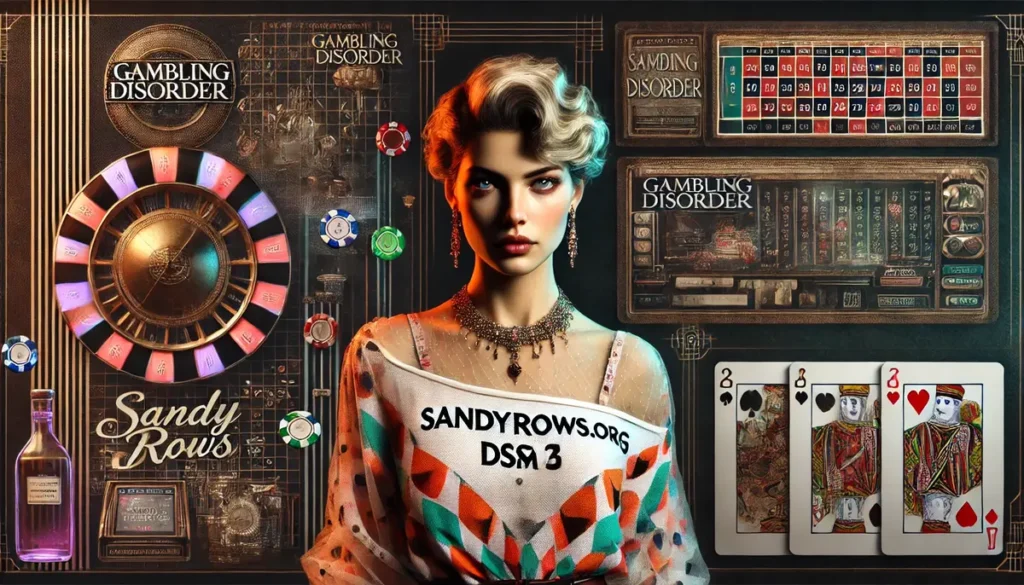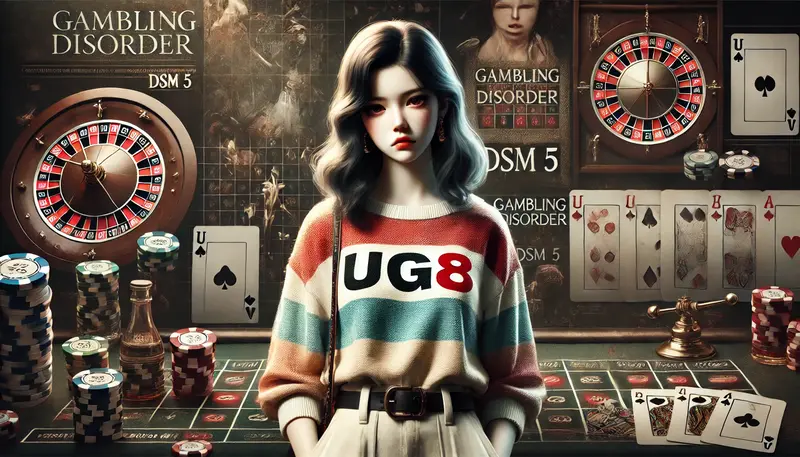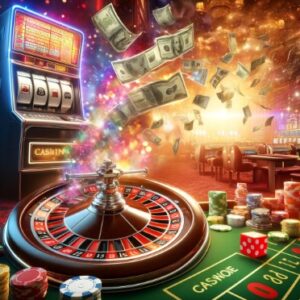
Gambling disorder DSM 5 has been a problem for many people and many generations. Especially at this time, anyone can easily play gambling through online gambling sites that there are many out there.
The only way to truly diagnose if you have a gambling disorder by using this rule. It is called as the gambling disorder DSM-5.
In which it uses psychological expertise to determine whether or not you have a gambling disorder. There are more than 5 indicators and we are going to discuss them all.These characteristics can help you self diagnose even without the help of experts.
So you do not need to go outside your house or to a doctor. Hence making it easier for anyone who wants to diagnose and then treat their addiction locally.
Gambling Disorder is actually treatable with the current medicine and therapy. If you don’t get this coming disorder checked and identify it then you may be in big trouble. Here are some of the ways to identify yourself and to diagnose.
This diagnosis will be as accurate as when you take a real test with a psychology.
What is Gambling Disorder?

Gambling disorder is a recognized behavioral addiction where individuals find it difficult to control their gambling behaviors despite experiencing severe negative consequences. Once referred to as pathological gambling, it is now classified under the DSM-5 (Diagnostic and Statistical Manual of Mental Disorders, 5th Edition) as a condition related to addictive behaviors.
Key Characteristics:
- A pattern of repeated gambling that disrupts personal, financial, and social stability.
- Behaviors similar to substance use disorders, including tolerance, withdrawal symptoms, and cravings.
- Commonly associated with feelings of restlessness, preoccupation with gambling, and a cycle of unsuccessful attempts to cut back or stop.
Common Impacts:
- Financial distress due to gambling-related losses.
- Strained or broken relationships.
- Increased risk of co-occurring mental health conditions such as anxiety, depression, or substance use disorders.
Fact: Gambling disorder is the first non-substance behavioral addiction to be formally recognized in the DSM-5.
DSM-5 Diagnostic Criteria for Gambling Disorder

To receive a diagnosis of gambling disorder, an individual must display at least four of the following criteria within a 12-month period:
- Increasing Risk Tolerance:
- A need to gamble with higher amounts of money to achieve the same level of excitement or thrill.
- Restlessness or Irritability When Cutting Back:
- Experiencing withdrawal-like symptoms when trying to reduce or stop gambling.
- Repeated Unsuccessful Attempts to Stop Gambling:
- Ongoing, unsuccessful efforts to control gambling habits.
- Preoccupation with Gambling:
- Constant thoughts about gambling, past experiences, or planning the next session.
- Using Gambling as an Escape:
- Gambling to relieve feelings of distress, loneliness, or anxiety.
- Chasing Losses:
- Repeatedly returning to gambling to recover lost money.
- Deception:
- Lying to conceal the extent of gambling involvement.
- Risking Important Relationships or Opportunities:
- Jeopardizing or losing significant personal relationships, educational opportunities, or employment due to gambling.
- Relying on Others for Financial Bailouts:
- Depending on family, friends, or others to alleviate financial problems caused by gambling losses.
Treatment Approaches
There are multiple evidence-based treatments available for individuals with gambling disorder.
- Cognitive Behavioral Therapy (CBT):
- Focuses on identifying and changing distorted thought patterns and behaviors related to gambling.
- Helps patients develop coping strategies, reduce urges, and address triggers.
- Fact: Studies show that CBT is one of the most effective therapeutic interventions for gambling disorder.
- Pharmacological Treatments:
- While no medications are FDA-approved specifically for gambling disorder, certain drugs may help:
- Selective Serotonin Reuptake Inhibitors (SSRIs): For co-occurring depression or anxiety.
- Opioid Antagonists (Naltrexone): To reduce cravings and impulsive gambling behaviors.
- Mood Stabilizers: For those with underlying mood disorders.
- While no medications are FDA-approved specifically for gambling disorder, certain drugs may help:
- Support Groups and Peer-Led Programs:
- Gamblers Anonymous (GA): Offers a structured, peer-support environment that promotes recovery and accountability.
- Family and Couples Counseling: Addresses relationship dynamics and helps rebuild trust and communication.
- Emerging Digital Therapies:
- Mobile apps and online platforms that provide CBT-based exercises, mindfulness techniques, and tracking tools.
- Telehealth sessions with licensed therapists for greater accessibility.
- Fact: According to recent studies, combining therapy with community-based support often results in better long-term outcomes.
Recent Research and Developments

- Neurobiological Insights:
- Advances in neuroimaging reveal changes in brain regions related to impulse control, decision-making, and reward processing in individuals with gambling disorder.
- Understanding these neural pathways can lead to more targeted and effective treatments.
- Genetic Studies:
- Emerging research suggests genetic predispositions may contribute to gambling disorder. Identifying specific genetic markers could pave the way for personalized interventions.
- Digital Interventions:
- The growth of teletherapy, online CBT programs, and specialized mobile apps has made treatment more accessible.
- Fact: A 2022 meta-analysis found that internet-based therapies were as effective as in-person sessions for many individuals, reducing barriers to care.
- Policy Changes and Prevention:
- Increased regulation of online gambling platforms, stricter advertising guidelines, and enhanced public awareness campaigns.
- Fact: In 2023, several countries implemented new age-verification measures and spending limits on online gambling sites to protect vulnerable populations.
- Integration with Other Health Services:
- Many healthcare systems now screen for gambling disorder during routine mental health assessments, ensuring earlier diagnosis and intervention.
Causes of Gambling Disorders
There are so many causes of gambling disorders that many people does not actually come to realization. Gambling disorder itself is a self-developed trade. This means that you yourself created the cycle of addiction or disorder.
It does not come genetically and it is something that is developmentally. A person can develop these kinds of traits and it may come from your surroundings. Such as the people you hang out with or the people that reached you up.
Gambling disorders is basically a disorder in which you have a problem with gambling. For example you gamble compulsively or you get mad every time you lose. Eventually you lose control and gambling controls you instead. So what should you do then huh, this might be the question that everyone is asking.
But first we’re going to identify whether or not that is actually a gambling disorder. Because someone that loses temper is different from someone that is pissed off all the time about gambling.
Gambling disorder is a trait that is developed over time and it has been in your life forever. On top of that the effects are also long term and that you might not even realize it until it’s way too late. This is different when you get mad every time you lose.
Because every time you lose you cool off and then you’re able to gamble or even stop but if you have a gambling disorder you won’t be able to stop at all. This would simply be the only thing that you think about all the time which is very dangerous for anyone that has gambling disorder.
8 Things to Know About Gambling Disorder DSM 5
Gambling disorder, as defined by the DSM-5, is a recognized behavioral addiction characterized by persistent, problematic gambling behaviors that disrupt personal, social, and occupational well-being. Understanding its criteria, associated risk factors, and available treatment options is essential for recognizing and addressing this complex condition.
1. Need to Gamble in High Amounts to be Satisfied
Each human being has a thing called as a happiness limit. Once you get to a certain amount of happiness, it no longer feel special. Since you need a new way or a new sensation but the same sensation does not come twice in a row.
Eventually people would be forced to gamble more. For example instead of betting a couple of dollars you need to bet lots. Such as hundreds of dollars. This is because your happiness tolerance have increased. Simple things no longer make you feel happy or make you feel as hyped as the first time you gamble.
The truth is nothing will ever feel the same. But learning how to manage your euphoric tolerance may be a good thing after all. Many people fail to do this and this would lead to a gambling disorder. Because you don’t know when to stop at all. Instead you keep gambling and gambling until you lose all of your money. So beware because this is one of the most important indication if you want to know gambling disorder dsm 5.
2. Increasing Amount of Winnings
A player that is never satisfied with also need to win more. Because every time you go big or go home you’re always going to win more or you’re going to lose more. And the only way for you to stop is when you lose more.
This is very dangerous because a person doing this would eventually lose all of their money without any help you are going to lose all that you own. This became one of the most major problems in huge cities. That is why there are so many gambling hotlines that you can call if you need help. This indicator is kind of simple to understand.
So if you always want more money that you have ever won than you have gambling disorders. But don’t worry because this is treatable once you know what the problem is. Just don’t be scared to identify and learn more about your problems.
3. Borrowing money
One common thing that people would try to do is to get more money. Because after you lose money you need a new way of income to feel your gambling addiction. This is one of the main causes of gambling disorders.
People identify gambling disorder by the amount of money and the frequency of money that you borrow. Some people go to the banks or even go to their friends. This is a great indicator of whether or not you are a gambling addict. If you’re an addict then you would try desperately to find so many new ways of gambling.
For example you’re going to borrow money to your parents or to any relatives. And when that does not work out you go to the bank and ask for a loan. This is very dangerous because I’m getting into addiction is one thing. But getting into that is another thing. You’re going to have to deal with two different problems at the same time if you do that.
This is an important indicator in which not many people realize. Even though it is very common That you see people borrow money just to gamble. Sometimes borrowing money may not even be enough. People would be so desperate that they would reach to other lengths and we will talk this in the other indicators.
4. Stealing money
This indicator is actually very closely related to the previous one. When people are desperate they need money. And the amount of money that they need is not little. They want to win big so that they could cover all of their losses.
All of the losses that they started losing from the very first time they gamble. These types officer accumulated over time and the amount could reach thousands to hundreds of thousands of dollars.
Knowing this then you might be in trouble if you do not cover those losses dot because your mind would be in a constant state of fear. You need to make that money back and then you would be relaxed. This is a common thing that many gambling addicts think about. And if they’re unable to do so then they need to make up the money for it.
One of the easiest way to do so is by stealing. Stealing goes against every single moral ability that you have. Because the loan is an option only if you’re given that option. But when there is no other way to get money then people tend to do crimes.
Many people gamble their future by dealing drugs or even stealing. This is dangerous and it could get you to serious trouble than you have already been into.
5. Lies and Denial
Next up we’re going to talk about denial and lies. It is very common that people that are addicted will lie and will be denial. They would never say properly that they are addicted to gambling and that they have spent a lot of money.
This is because this is their activity itself is shameful to begin with. The fact that they’re losing a lot of money is something to conceal instead of sharing to your friends or relative. This also relates to a person’s self-esteem. Where when you are in denial, it is hard to open up to anyone.
The easiest way to overcome is that you find someone that you can trust. As an addict with gambling disorders, this will be a hard thing to do. Because you have been pushing a lot of people away from your life. Just to cover up the fact that you have gambling addiction and other disorders. Lies and denial is repetitive and it will be repeated if not stop immediately.
6. Jeopardized Friendships and Relationships
Last but not least, there are also things that people do such as jeopardizing relationships. Jeopardizing is the definition of making excuses. Many relationships are severed when you keep on gambling. Addicts eventually run out of money and they would have to go to their family.
Jeopardized relationships happen because people get desperate. Being desperate is a step when a gambler loses the people closest to them.
Friendships are broken when you force someone out of their own will. For example when you need money you’re going to ask for this person to do so. But this person might not always want to lend you money. Because the truth is money itself is very important and many people need it. Not only you that needed to gamble and lose it all away.
Instead people need them to support their family right. Hence at the end of the day when you need these people to lend you money they are going to deny it. As a result you would be triggered and you would be pissed off. Because this is a common reaction off of gamblers that are triggered.
7. Often Preoccupied With Gambling
I’m with gambling disorder would be stuck in a endless cycle of gambling. As a result there would be nothing else on their mind besides gambling. Whether you are going to bed or doing anything else you are going to think of gambling all the time.
This is dangerous and this is an indicator that you are an addict. Because when you are addicted then there’s nothing else on your mind. You are preoccupied with this thought and there’s nothing else that you can do.
Eventually you would need help because this mindset of yours is already developed. You are gambling compulsively and there’s nothing that you can do to stop it. It may be problematic at first but of course you’re able to fix it by getting help.
8. Gamble When Feels Stressed
Everyone has their own coping mechanism when they are stressed. When they feel like the whole world is crushing them down. Some of you may resort to things such as smoking or alcohol. But those who have gambling disorders would see this as a reason for them to gamble.
Usually there is no right justification for someone to be able to gamble. Because gambling itself should be prohibited to begin with. But then, the gambling disorder starts to kick in. This is a very valid way of indicating whether or not a person has gambling disorders. It is normal for human beings to feel stressed.
What is not normal is how each and every one of those individuals are able to deal with their stress. If they are unable to deal with their stress in the most proper way, then they are going to lose a lot of money. Gambling while being stressed is considered as a big no.
Because when you are gambling, you need to be in the right clear mind set. Without the right and clear mindset, your mind would be filled with ego and emotions. Hence driving you to just do silly things. Such as betting all in and going all in.
You might also like: Top 10 Best Casinos in London
Conclusion
This is an important indicator in the gambling disorder DSM 5. Knowing what triggers these gambling disorder could help you prevent them. Do it right away. Before you fall into the category of a more severe gambling addiction.
That is all about today’s article and we hope this article has helped you.
Source :
https://overr.link/slotgacor/
https://infinity8.click
https://www.aw8cuan.com/id-id
https://update.buu.lol/
https://update.srt.monster/










